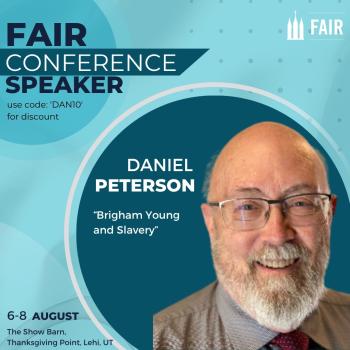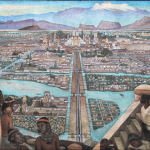
Ben McGuire began this morning’s session with a quite thought-provoking examination of the concept of translation and of its implications, particularly as they relate to the Book of Mormon. A very rich talk.
There have been some quite good discussions of women’s place in the Church, and of women and the priesthood, at this conference. Kathryn Shirts continued the discussion with a very good presentation.
(Sorry that I’m being so “summary” with these summaries. You really need to listen to them or to read them.)
I’ve been looking forward to Grant Hardy’s remarks, and I’m going to give them a bit of extra attention:
They didn’t disappoint.
Certain critics, I know, were also looking forward to them, but I suspect those critics were, or will be, disappointed.
Grant recalled the exciting times in late 1970s, where we had a strong positive message that we shared with confidence. These were exhilarating times, and we enjoyed high growth rates. Now, though, we often seem to be on the defensive. There are difficult issues with Church history and elsewhere. The Church is sometimes at odds with prevailing notions of fairness and equality. And it suffers from a currently fashionable pervasive distrust of large institutions, including churches. The question today is not necessarily just which Church is true, but why I need a church at all. And, perhaps unsurprisingly, we’re experiencing a period of very slow growth.
We need, he said, to step up our game.
He welcomed the rise of increasing academic discussions of Mormonism. Now, scholars are interested in the Mormon experience. Interest isn’t limited merely to anti-Mormons fighting Mormons. “Sometimes,” he said, “secularism is our friend. It opens things up.” I concur that this is quite a good thing.
He distinguished polemics from apologetics. Things aren’t usually black and white. They’re nuanced. We should assume good faith in many questioners and even in a number of critics. We should avoid “unhealthy partisanship.” We should “own up to problems.” We should reject rigid notions of scriptural inerrancy and prophetic infallibility.
I expect that some will want to read this as a rebuke of me and my ilk. And there’s no question that his comments summarized directly above conflict with the image of me that some have patiently constructed over the past decade and more (and that some of my critics evidently actually believe to be true). However, I agree completely with him on this point.
I liked his remarks very much. I agree, and I myself have said, that we should emphasize “positive apologetics” at least as much as “negative apologetics.” (I’ve used the very terms.)
He said almost nothing — and nothing of much importance — with which I disagreed.
Some critics, I happen to know, were eagerly anticipating his speech as a move toward viewing the Book of Mormon as “historical fiction.” They will be severely disappointed. “I believe,” he said, “that the Book of Mormon is a gift from God, and that the testimonies of ancient Nephite prophets are essential for our day.” While saying that a person could have saving faith in an inspired but ahistorical Book of Mormon, he declared his own conviction that, at the judgment bar, he will meet Nephi and Moroni. (Despite my own disagreement with proposals for a fictional-but-inspired Book of Mormon and my conviction that they both make a hash of the early history of the Restoration and tend to logical and spiritual instability, this has been my position for as long as I can remember: I’ve never advocated driving people out of the Church or excommunicating them for failing to believe in an actual Lehi colony.)
And so forth.
Again, you need to hear or read the talk itself.











